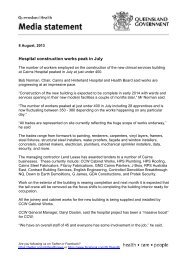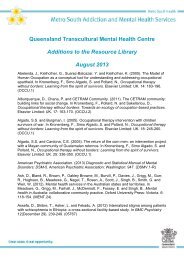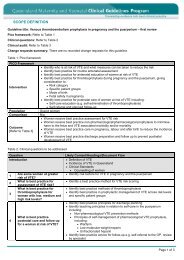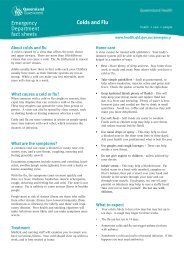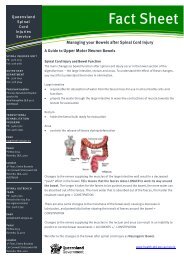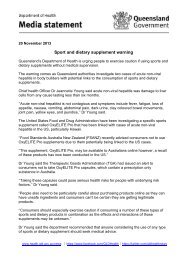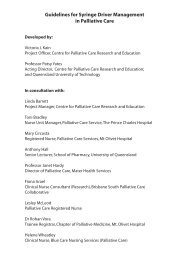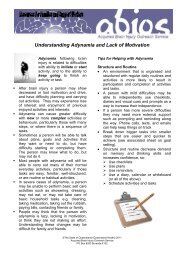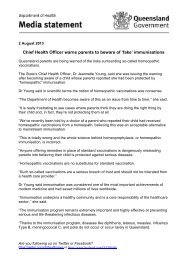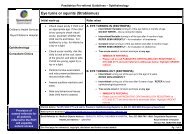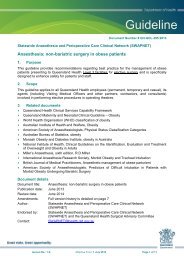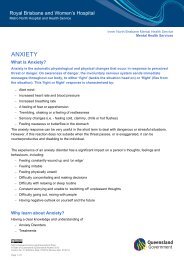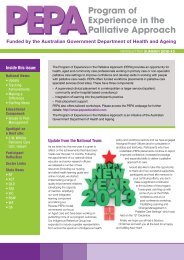Paediatrics - Queensland Health - Queensland Government
Paediatrics - Queensland Health - Queensland Government
Paediatrics - Queensland Health - Queensland Government
You also want an ePaper? Increase the reach of your titles
YUMPU automatically turns print PDFs into web optimized ePapers that Google loves.
Immune complications<br />
Acute rheumatic fever<br />
Recommend<br />
In Aboriginal and Torres Strait Islander communities where there are high rates of<br />
acute rheumatic fever (ARF) and rheumatic heart disease (RHD) treat streptococcal<br />
throat and skin infections early<br />
Any case of arthritis with fever in a child should be considered as possible ARF<br />
or septic arthritis and transferred to hospital for investigation and confirmation of<br />
diagnosis<br />
Regular penicillin prophylaxis is critical to prevent recurrences of ARF, which can<br />
lead to the development or worsening of RHD<br />
Background<br />
ARF is an auto-immune response to bacterial infection with group A Streptococcus<br />
(GAS) [1] in the throat (and possibly the skin); it affects the heart, joints, nervous<br />
system and skin<br />
Aboriginal and Torres Strait Islander Australians living in rural or remote settings are<br />
known to be at high risk. Those living in urban settings, Maori and Pacific Islander<br />
people and, potentially immigrants from developing countries also may be at high<br />
risk [2]<br />
ARF is predominantly a disease of children aged between 5 and 14 years although<br />
recurrent episodes may continue well into the fourth decade of life [1]<br />
Patients with recurring ARF have a higher risk of developing RHD<br />
RHD is a chronic condition resulting from scarring and deformity of the heart valves<br />
following ARF<br />
Related topics<br />
Upper respiratory tract infection - child<br />
Upper respiratory tract infection - adult<br />
Bacterial skin infections<br />
Bone and joint infections - child<br />
Acute rheumatic fever and rheumatic heart disease prophylaxis<br />
1. May present with<br />
• Fever and malaise<br />
• Painful tender swollen joints. Symptoms classically seen to progress from one<br />
joint to another (migratory polyarthritis) however only one joint may be affected<br />
(aseptic monoarthritis). Any joint can be involved but most commonly affects the<br />
large joints of the limbs - knees, ankles, elbows<br />
• Abdominal pain<br />
• Inability to weight-bear or walk unaided<br />
• Uncontrollable jerky movements of the trunk, face and / or limbs (Sydenham’s<br />
chorea), that disappear when asleep<br />
• Skin rash. This is rare, but highly suggestive of ARF (can be difficult to see in<br />
dark skinned people)<br />
• Small nodules over bony areas such as elbows and knees; again rare<br />
• History of a sore throat or skin infection within the previous 2 - 3 weeks<br />
• Breathlessness (if cardiac involvement), chest pain<br />
• Abnormal heart sounds<br />
2. Immediate management Not applicable<br />
Primary Clinical Care Manual 2011 Controlled copy V 1.0 575



